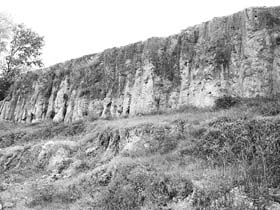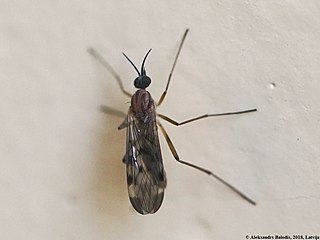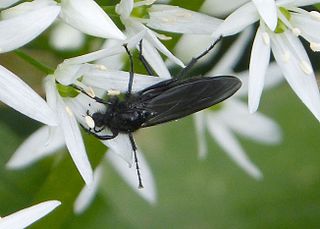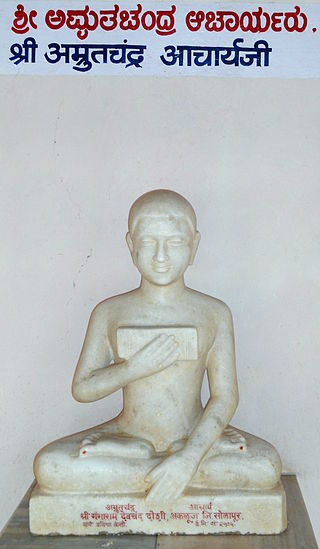
Chino cloth is a twill fabric originally made from 100% cotton. The most common items made from it, trousers, are widely called chinos. Today it is also found in cotton-synthetic blends.

All India Kisan Sabha, is the peasant or farmers' wing of the Communist Party of India, an important peasant movement formed by Sahajanand Saraswati in 1936.

Nemichandra, also known by his epithet Siddhanta Chakravarty, was a Jain acharya from present-day India. He wrote several works including Dravyasamgraha, Gommatsāra, Trilokasara, Labdhisara and Kshapanasara.

Sripadaraja or Sripadaraya, also known by his pontifical name Lakshminarayana Tirtha, was a Hindu Dvaita philosopher, scholar and composer and the pontiff of the Madhvacharya mutt at Mulbagal. He is widely considered the founder of Haridasa movement along with Narahari Tirtha. He has influenced both Carnatic music and Hindustani music through his compositions. His songs and hymns, written under the mudra of Ranga Vitthala, contain the distillation of Dvaita principles infused with mysticism and humanism. He is also credited with the invention of the suladi musical structure and composed 133 of them along with several kirtanas. He was the advisor of Saluva Narasimha Deva Raya and mentored the young Vyasatirtha. He also authored a commentary on Jayatirtha's Nyaya Sudha called Nyayasudhopanyasa-Vagvajra. Sripadaraja is believed to be the incarnation of Dhruva.
Asela was an early monarch of Sri Lanka of the Kingdom of Anuradhapura, based at the ancient capital of Anuradhapura from 215 BC to 205 BC. He was the youngest of the many sons of Mutasiva and brother of previous monarchs Devanampiya Tissa, Uttiya and Mahasiva. Asela fought Sena and Guttika in a battle to re-establish Vijaya rule in 215 BC, but in 205 BC the kingdom of Anuradhapura was again invaded by a Tamil, Tamil trader from South India named Ellalan killing Asela.

The Curtiss C-1 Canada was a twin-engined bomber aircraft of the First World War which was designed by Curtiss of America to be built by their Canadian subsidiary for the British Royal Naval Air Service and Royal Flying Corps. Although large orders were placed, only twelve were built, the type being rejected in favour of more capable aircraft such as the Handley Page O/100.

Bara is a village in Rupnagar District in Punjab, India. The village has mainly two Jatt Sikh surnames Chakkal and Heer and lies on the Rupnagar-Morinda Road at the left bank of a seasonal monsoon rivulet called Budki Nadi, about four kilometers south-west of the city Ropar and 40 km (25 mi) northeast of Chandigarh on National Highway 205 (India) (NH-205). Bara is the site of significant archeological excavations connected with the Indus Valley civilization. It has some evidence of being home to a culture that was a pre-Harappan strand of the Indus Valley Civilization. Baran and Harappan cultures may have intertwined and coexisted in some places, such as Kotla Nihang Khan, also in modern-day Punjab.
The Pranami Sampradaya, also known as Pranami or Pranami Panth is a Hindu sect that worships Krishna as the Supreme God. It is based on the teachings of Mahamati Prannath and Devchandra and their holy book, the Tartam Sagar.
Yogi Gita, literally meaning “Yogi’s song”, refers to a collection of spiritual teachings and prayers of Yogiji Maharaj, the fourth spiritual successor to Swaminarayan. The Yogi Gita encapsulates the necessary attributes one must imbibe in order to progress spiritually and become Brahmarup or attaining the highest level of spiritual enlightenment. The Yogi Gita contains invaluable interpretations of Swaminarayan's teachings from the Vachanamrut. This, too, provides an expansive view of the Akshar-Purushottam Darshan, the doctrinal foundation of BAPS philosophy.

Sylvicola fenestralis, the window gnat, is a medium gnat (6–10 mm) of the family Anisopodidae. It is found in the Palearctic.
The Colombo Journal was a short-lived English-language bi-weekly newspaper in Ceylon. The newspaper started on 1 January 1832 with George Lee as editor. George Lee was the Superintendent of the Government Press and later Postmaster General. The newspaper had the support of the government and Governor Robert Wilmot-Horton. Apart from Horton and Lee other senior government officials who wrote for the newspaper included the governor's private secretary Henry Tufnell and George Turnour. Criticism of the British government led to the newspaper being closed by the Colonial Office on 31 December 1833.

Chaoborus flavicans is a species of fly in the family Chaoboridae. It is found in the Palearctic.

Chironomus anthracinus is a species of fly in the family Chironomidae. It is found in the Palearctic.
Pipunculus campestris is a species of fly in the family Pipunculidae. It is found in the Palearctic.

Nephrotoma flavescens is a species of fly in the family Tipulidae. It is found in the Palearctic.

Dilophus febrilis is a species of feverfly the family Bibionidae. It is found in the Palearctic.
The Vasu Doorjamb Inscription is an early 1st-century CE Sanskrit inscription in Brahmi script dedicated to the deity Vāsudeva, related to the Vaishnavism tradition of Hinduism. It is also one of the several dedicatory inscriptions from Mathura bearing the name of the Indo-Scythian Northern Satrap ruler Sodasa, which are useful as historic markers for the first half of the 1st century CE.

Amritchandra was a Digambara Jain Acharya who wrote commentaries on Samayasāra called Atmakhyati and Samaysar Kalasha, Pravachanasara and Pancastikayasara. He also wrote independent books of Puruşārthasiddhyupāya and Tattvartha Sara. He wrote in Sanskrit language.
Silco is an unincorporated community in Camden County, in the U.S. state of Georgia.
Silk Hope is an unincorporated community in Chatham County, in the U.S. state of Georgia.












